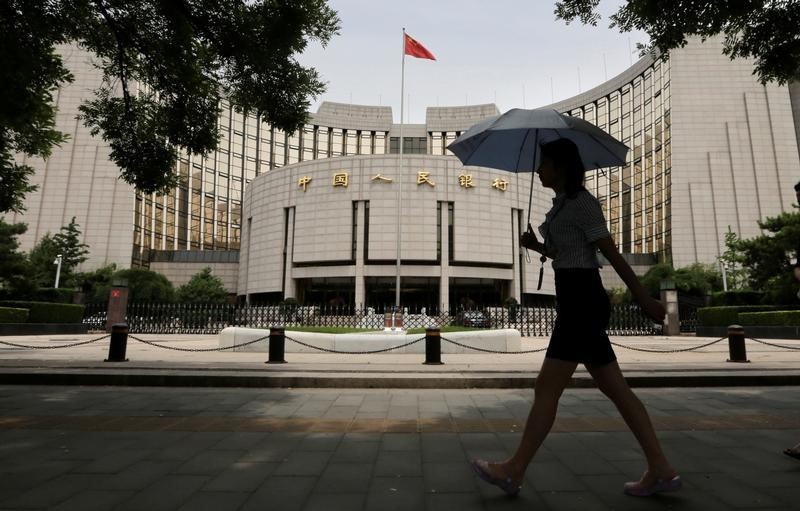With uncertainty rising, is gold’s bull run far from over?
By Geoffrey Smith
Investing.com -- China's stock markets had their worst day in five years as they reopened, catching up with losses posted globally during the extended New Year holiday. The Chinese stock market regulator banned short-selling while the central bank injected a modest amount of net liquidity to support the system. European purchasing managers indices rebounded weakly, setting a low bar for the U.S. Institute of Supply Management's survey later. The post-Brexit era got off to a rocky start as Boris Johnson revived the specter of tariffs between the U.K. and EU. Google parent Alphabet (NASDAQ:GOOGL) heads the day's earnings roster. Here's what you need to know in financial markets on Monday, 3rd February.
1. China markets tumble on reopening after holiday
China’s financial markets shook as they reopened after an extended Lunar New Year holiday. The main stock markets in Shanghai and Shenzhen fell some 8%, and the yuan fell 1.2% against the dollar to its lowest in eight weeks – once again breaching the psychologically important level of 7 to the dollar.
That happened despite a ban on short-selling by the stock market regulator and the injection of a net $22 billion into the domestic money market by the central bank. The People’s Bank of China effectively chose to roll over all of the extra seasonal liquidity that it pumped in ahead of the holidays, and add a little more for good measure.
There has been no major change in the narrative around the outbreak over the weekend: the death toll rose to 361 from 17,205 confirmed cases.
2. Markets set to bounce at opening
U.S. stocks are set to open with a bounce on Monday after a Friday session where selling had accelerated into the close.
By 6:30 AM ET (1130 GMT), Dow 30 futures were up 107 points, or 0.4%, while S&P 500 Futures were up 0.4% and the Nasdaq 100 futures contract was up 0.5%.
European markets had also opened broadly higher, with the benchmark Stoxx 600 index edging up 0.1%. Commodities had also stabilized, with copper futures set to break a run of 13 straight down days. The dollar index, meanwhile, strengthened by 0.3%, due chiefly to gains against the euro and sterling.
3. Alphabet's numbers are up next
Alphabet (NASDAQ:GOOGL), the parent company of Google, reports its quarterly results after the closing bell on Monday, the first time under the leadership of Sundar Pichal.
Analysts polled by Investing.com expect earnings per share to have fallen some 2% year-on-year to $12.50 a share, on a 19% rise in revenue to $46.9 billion.
Alphabet (NASDAQ:GOOGL) stock gained 7% in January, outperforming the broader market after underperforming with a gain of only 19% in 2019.
Investors will be looking for as much detail as possible on the contribution of cash cow YouTube, as well as the progress of self-driving technology unit Waymo, among other things.
4. Sterling tumbles as post-Brexit era starts awkwardly
The pound tumbled over 1% against the dollar and nearly 0.8% against the euro as the post-Brexit era began with some confrontational rhetoric out of London.
U.K. Prime Minister Boris Johnson said in a keynote speech that he would rather accept tariffs than the jurisdiction of the European Court of Justice, reviving the risks of an economically damaging rupture with the EU at the end of an agreed transition period which ensures that nothing essentially changes in the U.K.-EU relationship until the end of the year.
The EU’s members haven’t yet agreed on the mandate they will give the European Commission as regards negotiating a free-trade deal with the U.K. However, governments and Commission representatives had been largely consistent in the three years since the referendum that they would press for an extensive role for the ECJ in any FTA.
5. PMIs point to weak rebound
On an otherwise light day for data, purchasing managers indices across Europe showed the manufacturing sector still in contraction at the start of 2020, albeit apparently past the worst of last year’s slowdown.
The eurozone manufacturing PMI from IHS Markit rose to 47.9, a little higher than the 47.8 expected but still below the 50 line that separates growth from contraction. The U.K. PMI did make it back to 50 for the first time since May but the news was overshadowed by the post-Brexit tensions.
Markit’s PMI for the U.S. is due at 9:45 AM ET (14:45 GMT), while the Institute of Supply Management’s manufacturing survey follows quarter of an hour later.
There are also U.S. vehicle sales numbers due at 6 PM ET (2300 GMT).
